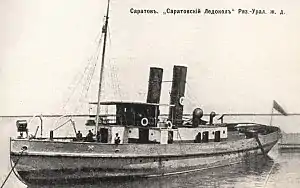Saratovskiy Ledokol
Saratovskiy Ledokol (Russian: Саратовский ледокол; literally: Saratov icebreaker) was a Russian steam-powered twin-screw icebreaker built for the Ryazan-Ural Railway Company at Sir WG Armstrong Mitchell & Company in Newcastle upon Tyne, United Kingdom, in 1896.[1] She was primarily used to escort a railway ferry across Volga during the winter months, but could also carry cargo and passengers on her own. In order to be able to pass the Mariinsk Canal System with 28-foot (9 m) wide locks, Saratovskiy Ledokol could be split into two halves along the centerline, each with its own oil-fired boilers, compound steam engine, and smoke stack.[2]
 | |
| History | |
|---|---|
| Name: | Saratovskiy Ledokol (Саратовский ледокол) |
| Owner: | Ryazan-Ural Railway Company |
| Port of registry: | Saratov, Russia |
| Builder: | Sir WG Armstrong Mitchell & Company, Newcastle upon Tyne, United Kingdom[1] |
| Yard number: | 627[1] |
| Launched: | 7 May 1895[1] |
| In service: | 1896–1968 |
| Fate: | Sank in 1968 |
| General characteristics [2] | |
| Type: | Icebreaker |
| Displacement: |
|
| Length: | 44.80 m (147 ft) |
| Beam: | 11.43 m (38 ft) |
| Draft: |
|
| Boilers: | Four oil-fired boilers |
| Engines: | Two compound steam engines, 1,420 ihp (total) |
| Propulsion: | Two propellers |

Saratovskiy Ledokol sank by the railway bridge in 1968. There are plans to lift the vessel and restore her as a monument by the river in 2021.[3] The lifting operation commenced in June 2020.[4]
References
- Saratovskiy Ledokol. Tyne Tugs and Tug Builders. Retrieved 2018-12-30.
- Andrienko, Vladimir Grigorievich (2017), Ледокольный флот России 1860-е – 1918 гг., ISBN 978-545-76850-6-2
- Со дна Волги в 2021 году поднимут уникальный ледокол, затонувший в Саратовской области. TASS, 23 January 2018. Retrieved 2018-12-30.
- "В Саратове со дна Волги поднимают затонувший буксир" (in Russian). Взгляд-инфо. 2 June 2020. Retrieved 2 June 2020.